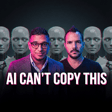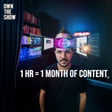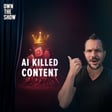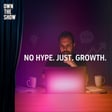
A Marketing Leaders Guide to Approaching the Future of Ai
In this episode of the AI-Driven Marketer, Dan Sanchez talks to Courtney Baker, CMO at Knownwell, in a dynamic discussion about leading marketing teams in the age of AI. They delve into how AI is reshaping marketing roles, strategies, and team dynamics. From experimenting with AI in small teams to preparing larger teams for AI integration, they cover the multifaceted impact of AI on marketing leadership. Listen as they explore practical ways AI can enhance marketing strategies and team productivity, reflecting on the evolving landscape of AI in marketing.
Links Mentioned:
- Knownwell's website (https://knownwell.com)
- Knownwell's AI Know How podcast (https://knownwell.com/podcast/)
- Courtney Baker's LinkedIn profile (https://www.linkedin.com/in/courtney-baker-0b569b33/)
- Knownwell's beta waitlist. For those interested in their intelligent enterprise operating system (https://knownwell.com/join-the-knownwell-cq-waitlist/)
- Knownwell's free assessment tool (https://knownwell.com/assessment)
Episode Timestamps:
00:42 - Courtney's perspective on AI's influence in her marketing role.
02:45 - Training and leveling up marketing teams in AI.
04:01 - The agility of small teams in adopting AI technologies.
05:58 - The concept of turning a small team into a powerhouse with AI.
07:11 - Recruiting talent in the age of AI.
09:15 - Fostering a learning mindset and embracing AI in marketing.
13:03 - Utilizing AI as a strategic tool in marketing operations.
19:22 - Encouraging a growth mindset in teams facing AI integration.
22:33 - The future of AI in operational and strategic roles in marketing.
27:12 - AI as a co-thinking partner in strategy formulation.
30:18 - Focusing areas for marketing leaders in the next six months.
33:27 - Courtney Baker's insights on Knownwell and AI in client retention.



![What’s Your Authority Score? [The 5-Factor Test] image](https://media.zencastr.com/cdn-cgi/image/width=112,quality=85/image-files/630c9f06819f8b3dba5fa460/cfbaccba-f587-45de-a41f-e2c99c15e2a5.png)
![The Audience Growth Engine [Full Framework] image](https://media.zencastr.com/cdn-cgi/image/width=112,quality=85/image-files/630c9f06819f8b3dba5fa460/46b84fd1-e856-4687-9aee-6b4a7e0bc7ff.png)



![The "Dream 100" Execution Plan [Google Sheet System] image](https://media.zencastr.com/cdn-cgi/image/width=112,quality=85/image-files/630c9f06819f8b3dba5fa460/fcd89374-76a4-4e58-a2e3-2bb7ddda4364.png)










